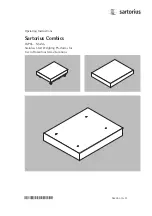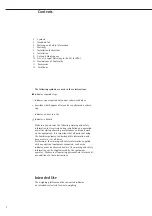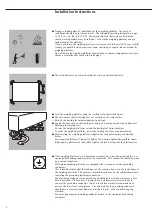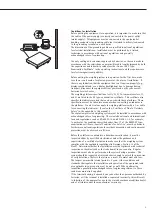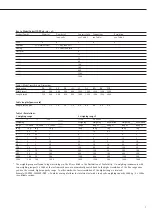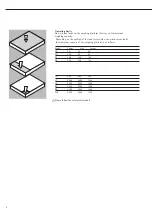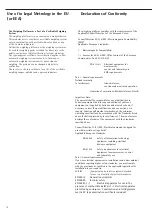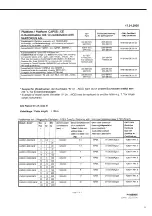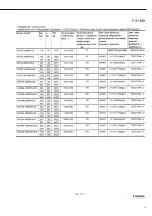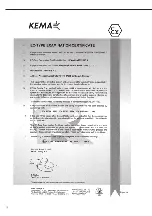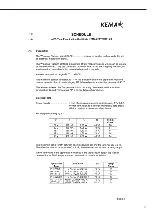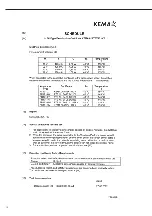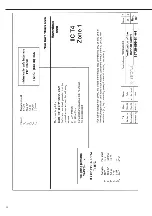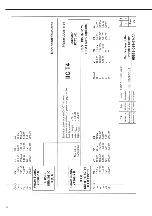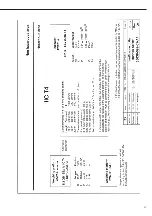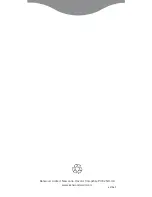
9
Care and Maintenance
Cleaning
$
Unplug the weighing instrument from the AC power before cleaning. Remove dust from the
weighing platform regularly (see EC type-examination certificate)
$
If the weighing instrument is in a dry room, use a damp cloth to wipe down the weighing
platform. You can use common household cleaning agents. Follow the manufacturer’s
instructions for the cleaning agent.
$
The leveling feet are covered with rubber buffers. In hazardous areas/locations, these must be
cleaned using only a damp cloth. This prevents build-up of static electricity.
!
Never use concentrated acids, bases, solvents or pure alcohol to clean the weighing platform.
$
To clean the weighing platform in a wet area, wash it down using a gentle stream of water
(60°C max.) sprayed over the top of the load plate.
!
Do not use high-pressure cleaning equipment to clean the weighing platform.
> If the water that you use to clean the weighing platform is too hot or too cold, the difference in
temperature between the water and the weighing platform can cause condensation within the
weighing platform. This condensation may cause the weighing platform to malfunction.
$
If the scale is installed in a pit, make sure that no debris builds up in the crevices between the
pit and the platform, to prevent weighing errors.
$
Regularly remove debris from the bottom of the pit.
Cleaning the Inside of the Weighing Platform
$
To clean the inside of the weighing platform, remove the load plate. Be especially careful when
removing the load plate from scales of 1000 x 1000 mm or larger.
!
Please follow the safety instructions.
$
Use compressed air to blow debris out of the inside of the scale or flush out using a gentle
stream of water (60°C max.). Make sure that no debris builds up in the gap between the load
receptor and the fastening plate, to avoid compromising the overload protection.
Corrosive Environment
$
Remove all traces of corrosive substances from the weighing platform on a regular basis.
Instructions for Recycling the Packaging
If you no longer need the packaging after successful installation of the equipment, you should
return it for recycling, as it is a valuable source of secondary raw material. Sartorius products
are packaged to ensure safe shipment using environmentally friendly materials. For information
on recycling options, including recycling of old weighing equipment, contact your municipal
waste disposal center or local recycling depot. Make sure you remove the batteries before
disposing of the equipment. Rechargeable batteries are toxic waste and as such may not be
disposed of with normal household waste. Contact your municipal waste disposal center or local
recycling depot for details on the proper disposal of batteries.
Model-specific Information: Serial Number Coding
The month and year of manufacture are encoded in the serial number as follows:
Y M M x x x x x
Y= Year:
1
2000–2006
2
2007–2013
3
2014–2020
4
2021–2027
5
2028–2034
6
2035–2041
7
2042–2048
8
2049-2055
9
2056-2062
The first digit represents a 7-year period as indicated in the table above. The next 2 digits
represent the month. The months are numbered consecutively, starting with 13, over the entire
7-year period. Thus the number representing the month also indicates the specific year of
manufacture.
2000
13-24
2001
25-26
...
Example:
113xxxxx -> January 2000
The individual devices are numbered consecutively in the last 5 digits, starting from 00000 again
at the beginning of each month.
Summary of Contents for Sartorius Combics CAPXS Series
Page 13: ...12 EC Type Approval Certificate...
Page 14: ...13...
Page 15: ...14...
Page 16: ...15...
Page 17: ...15...
Page 18: ...16...
Page 19: ...17...
Page 20: ...18...
Page 21: ...19...
Page 22: ...20...
Page 23: ...21...
Page 24: ...22...
Page 25: ...23...
Page 26: ...24...
Page 27: ...25...
Page 28: ...26...
Page 29: ...27...
Page 30: ...28...
Page 31: ...29...
Page 32: ...30...
Page 33: ...31...


